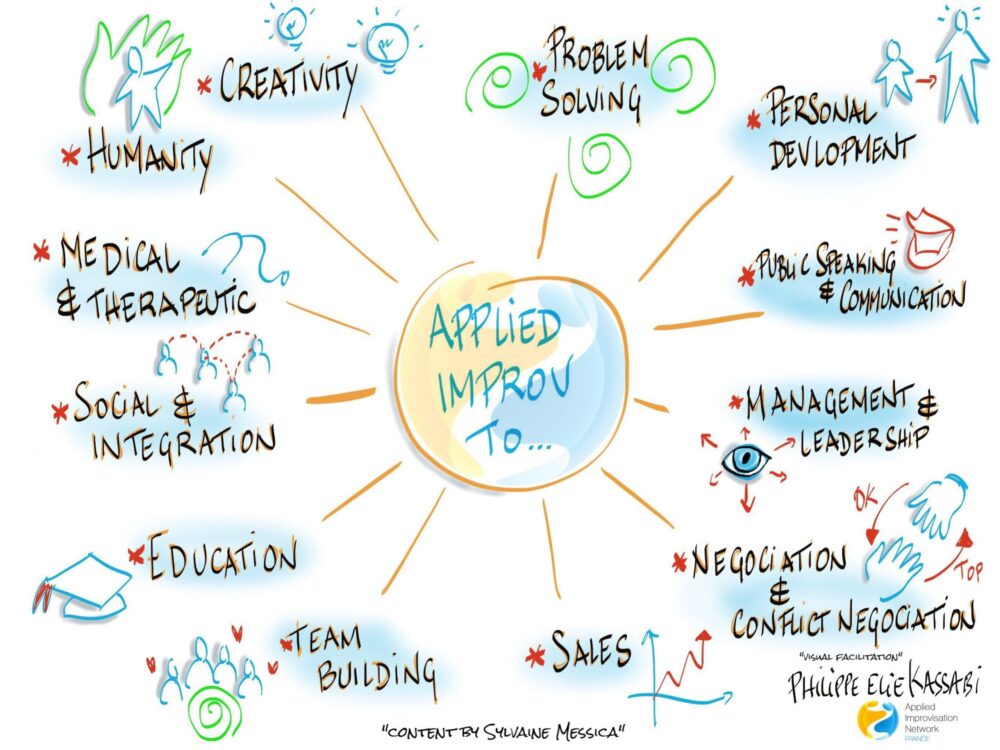APPLIED IMPROVISATION - PART 1/3





Wikipedia defines Applied improvisation well.

“Applied improvisation is the application of improvisational theatrical methods in various non-theatrical fields…” –WIKIPEDIA
Because Improvisation has an impact on everything that people do, applied improvisation has practical connections in every area of life, work and leisure.
EVERYTHING
That might seem like an overstatement but consider improvisation’s more obvious concepts:
creativity, communication, control, relationship, attitude, adaptibility, change, empathy, awareness, reaction, story, etc.
There’s something there for everyone.
Improvisation’s broad reach opens the door to a lot of opportunities for improvisers looking for a way to make a business of their love of impro. As good as that seems, there are some drawbacks which we will address later.
Applied improvisation can be a difficult concept to grasp for those who see improvisation only as a superficial skill used in comedy clubs. (And some people do). Many people outside of the improvisation world only recognize the performance aspect. They question how improvisation could benefit their organization. Applied improvisation has an image hurdle to overcome.
The Applied improvisation “CURE ALL” isn’t for everyone but as the improvisation community expands and creates more hungry improvisers wanting a way to monetize their love for their art, it offers another opportunity for exploration.

Here are some examples of applied workshops I've given to groups and the type of work we did:
.........................(Drop me a note if you are interested in details or to explore a project)...........................
In the wild west of APPLIED IMPROVISATION, there are issues and barriers that exist. Here are a few.
Many improvisers with only a bare understanding of improvisation leap into the "applied" world, leading to a bad reputation for the practice of Improvisation in the outside community.
This concept is embraced by too many who go into workshops with a lack of knowledge of who they are working for rather than researching the company that hires them, and developing a unique plan .
I've heard business leaders say this of some Applied Improvisers. They don't want to be "YES AND-ed" superficially. When careers and hudred's of thousands of dollars are on the line, back yourself up with science, research and facts.
Many clients see Improvisation as FAST AND FUNNY. Many participants see it as a field for the confident and loud. Many improvisers walk into the room like they would walk on stage and they fulfill the fears of participants that this is SHOW-BIZ. BE in their world. Don't impose your world on them.

WHERE IT'S BEING DONE RIGHT!
Alan Alda best known by many for his character on the TV show M*A*S*H* has made a stellar impact in the field of Science communication. His work has become an integral part of Stoney Brook University in New York,
CLICK THE TITLE for an enlightening little article from psychology today author, Clay Drinko, Ph.D. The article discusses, social anxiety, brain connectivity, language and creativity centers in the brain, uncertainty intolerance and more.
There are approximately NINE THOUSAND articles referencing Improvisation on this American government website. In one example, a research paper shows the benefits of Improvisation for children and young adults dealing with the psychological issues resulting from disasters like the massive earthquakes in Japan. The LONG title is.... (("Applied Improvisation Enhances the Effects of Behavioral Activation on Symptoms of Depression and PTSD in High School Students Affected by the Great East Japan Earthquake")) The site has a lot of interesting examples of Applied Improvisation.
APPLIED IMPROVISATION has been around before the term existed. It will continue developing as long as People, businesses and organizations want to improve.
Check next month's newsletter for more in-depth ideas, examples and paths to success with Applied Improvisation as our 3 part exploration continues.